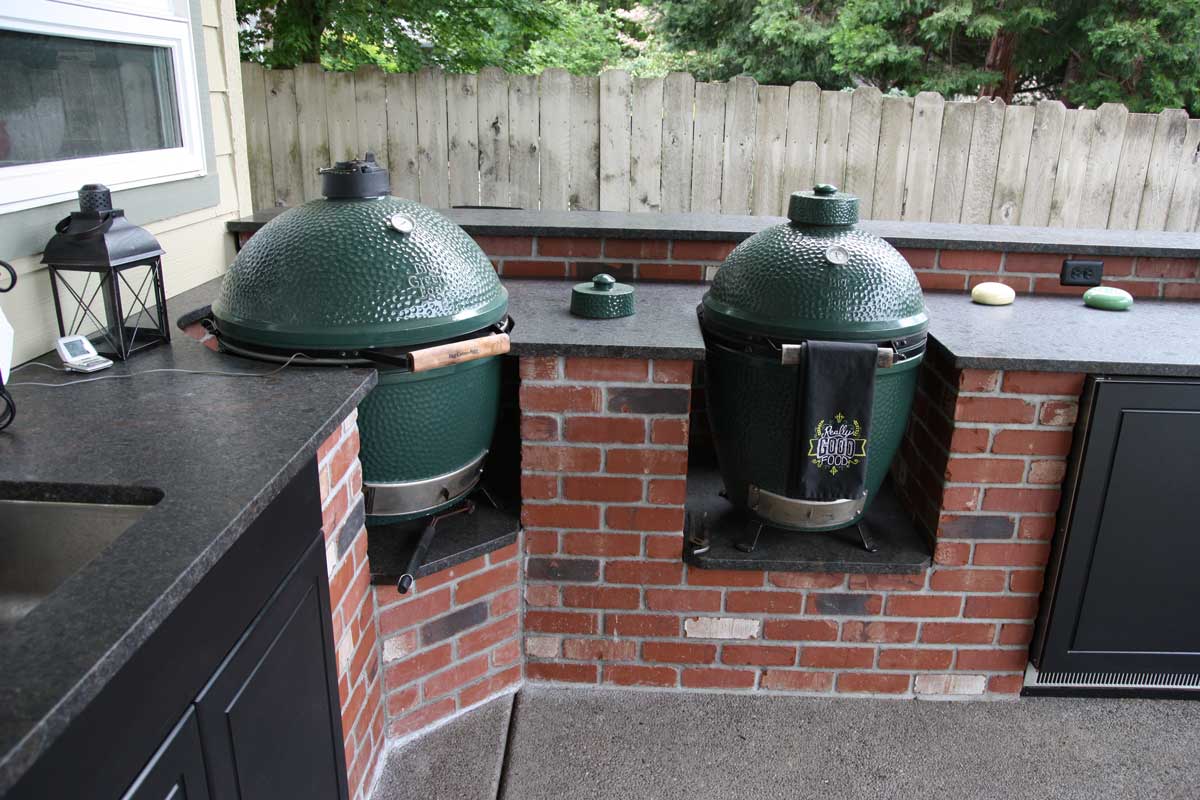Best Practices for Maintaining Your Outdoor Kitchen
In-home improvement and outdoor living, outdoor kitchens have emerged as a popular trend. These spaces offer a unique blend of culinary functionality and open-air leisure, providing a perfect setting for backyard barbecues, family gatherings, and tranquil morning coffees. However, to maintain the allure and functionality of these spaces, it’s crucial to adhere to the best practices for maintaining your outdoor kitchen.
This involves a series of steps, including protecting your kitchen elements from the elements, preventing rust and damage, and ensuring fire safety and pest control. Each of these aspects plays a vital role in preserving your outdoor kitchen’s aesthetic appeal and operational efficiency.
This guide will delve into these aspects, providing practical tips and insights to keep your outdoor kitchen in excellent condition all year round. Let’s embark on this journey to ensure your outdoor kitchen remains a cherished extension of your home.
Protecting Your Outdoor Kitchen
An essential part of maintaining your outdoor kitchen involves taking proactive measures to protect its various components.
Protecting Countertops
Your kitchen countertops are one of the most exposed surfaces in your outdoor kitchen. They face the brunt of weather elements, food spills, and heavy utensils. To protect them, consider using sealants suitable for the countertop material. Regular cleaning and immediate removal of spills can also prevent staining and damage.
Covering Your Grill and Furniture
Your grill and furniture are significant investments that add functionality and comfort to your outdoor kitchen. Consider using high-quality covers to protect them from weather elements and prolong their lifespan. These covers should be waterproof, UV-resistant, and fit well to provide maximum protection.
Protecting Your Space From Yard Debris
Yard debris such as leaves, twigs, and dust can accumulate in your outdoor kitchen, leading to potential damage and making the space less appealing. Regular sweeping and cleaning can help keep this debris in check. Additionally, consider installing screens or barriers to reduce the debris entering your kitchen area.
Disconnecting Utilities When Not in Use
Lastly, disconnecting utilities when not in use is a crucial safety measure. This includes turning off gas supplies to grills and heaters and disconnecting electrical appliances. This prevents potential accidents, saves energy, and reduces wear and tear on your appliances.
By taking these protective measures, you can ensure that your outdoor kitchen remains a safe, clean, and enjoyable space for many years to come.
Preventing Rust and Damage
To maintain the longevity and functionality of your outdoor kitchen, it’s crucial to prevent rust and damage. Here are some strategies to help you achieve this.
Regular Cleaning
Regular cleaning is the first line of defense against rust and damage. This includes wiping down surfaces after use, cleaning grills after cooking, and removing any food particles or spills that could attract pests. Regular cleaning keeps your kitchen looking its best and prevents the buildup of moisture and debris that can lead to rust and damage.
Use of Protective Covers
Protective covers can significantly reduce the risk of rust and damage. Covers protect your appliances and furniture from the elements, reducing exposure to rain, snow, and sunlight that can cause rust and fading. Ensure the covers are waterproof and fit well to provide maximum protection.
Proper Storage During Winter
Finally, proper storage during winter can help prevent rust and damage. If you live in a region with harsh winters, consider storing removable items like cushions and portable appliances indoors. For fixed appliances, ensure they are thoroughly cleaned, dried, and covered before the onset of winter.
By implementing these strategies, you can significantly reduce the risk of rust and damage, ensuring your outdoor kitchen remains in excellent condition for years.
Fire Safety and Pest Control
In addition to regular maintenance and cleaning, fire safety and pest control are critical aspects of maintaining an outdoor kitchen.
For fire safety, ensure all appliances are turned off when not in use, and keep a fire extinguisher nearby. Regularly check for gas leaks and ensure all electrical installations are up to code.
Pest control is equally important. Regular cleaning and removal of food waste can deter pests. Use natural or professional pest control solutions to keep your outdoor kitchen pest-free if necessary. You can ensure a safe and enjoyable outdoor cooking experience by prioritizing these aspects.
Best Practices for Cleaning Your Outdoor Kitchen
Maintaining an outdoor kitchen goes beyond protecting it from the elements and ensuring safety. A significant part of maintaining an outdoor kitchen involves keeping it clean. A clean outdoor kitchen is not only more enjoyable to use, but it also helps prolong the lifespan of your appliances and furniture. This section will explore the best practices for cleaning your outdoor kitchen, from regular grill cleaning to taking care of your outdoor appliances and countertops. Let’s dive in to ensure your outdoor kitchen remains a clean, inviting, and functional space for all your outdoor cooking adventures.
Regular Cleaning of the Grill
One of the most used appliances in an outdoor kitchen is the grill. Keeping it clean is crucial for its performance and longevity.
Avoiding Wire Brushes
While wire brushes have been a go-to tool for many when cleaning grills, they can pose a risk. The bristles can dislodge and stick to the grill grates, which can then end up in food. Therefore, avoiding using wire brushes for cleaning your grill is recommended.
Alternative Cleaning Tools
Instead of wire brushes, consider using alternative cleaning tools. A grill stone or a ball of aluminum foil can effectively remove stubborn grime and burnt food particles. For the grates, a damp cloth with baking soda can work wonders.
Regular cleaning after each use can prevent buildup and make cleaning more manageable. It also helps to heat the grill before cleaning, as it makes it easier to remove debris.
By maintaining a clean grill, you ensure a better cooking experience and extend your grill’s life.
Cleaning Outdoor Appliances and Countertops
Keeping your outdoor appliances and countertops clean is essential to maintaining your outdoor kitchen.
Cleaning Stainless Steel Surfaces
Stainless steel surfaces are added to outdoor kitchens due to their durability and sleek appearance. However, they can show smudges and fingerprints easily. To clean these surfaces, use a mild detergent mixed with warm water. Always dry the surfaces thoroughly after cleaning to prevent water spots and streaks. A paste of baking soda and water can be adequate for stubborn stains or burnt-on grime.
Cleaning Outdoor Kitchen Countertops
The method for cleaning outdoor kitchen countertops depends on the material. A mild detergent and warm water will do the trick for most materials. Avoid using abrasive cleaners or tools that can scratch the surface. For stubborn stains, baking soda and water paste can be helpful. Always rinse thoroughly and dry after cleaning.
Remember, regular cleaning keeps your outdoor kitchen looking its best and prevents the buildup of bacteria and grime, creating a healthier cooking environment.

